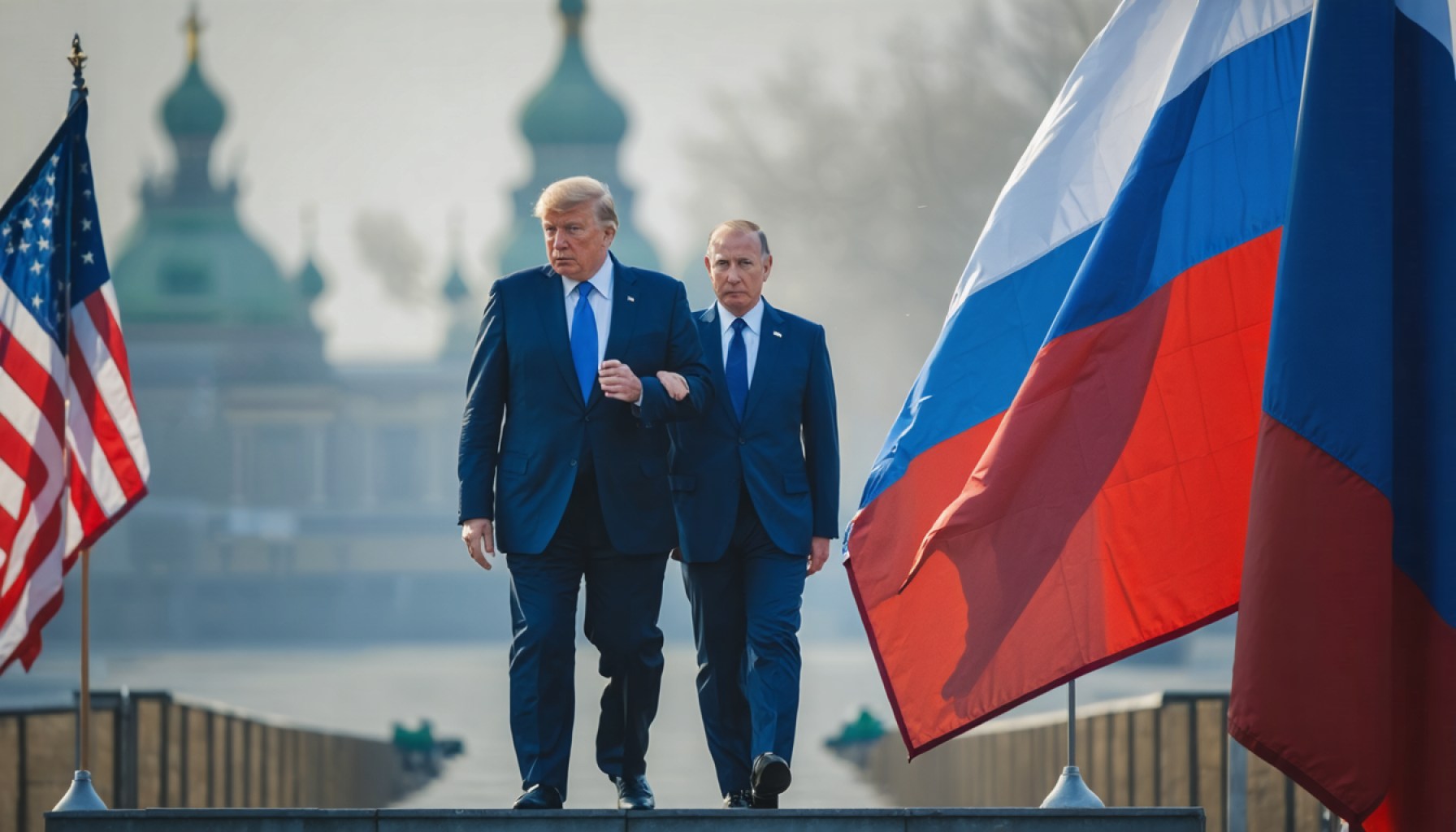- Russia’s engagement in talks with the U.S. in Riyadh marks a potential shift from political isolation due to the Ukraine conflict.
- The dialogue aims to address the war in Ukraine, offering a glimmer of diplomatic rapprochement amid international tension.
- This reopening of communication channels reflects Russia’s need to address sanctions and regain global standing.
- No concrete outcomes have emerged yet, but the act of dialogue suggests possible easing of tensions.
- The diplomatic discussions hint at hopes for ending the prolonged conflict, sparking cautious optimism worldwide.
- The situation underscores the potential of consistent dialogue in transforming conflict zones into peaceful resolutions.
Sunny skies over Riyadh formed an unusual backdrop for a momentous meeting that saw Russia’s political isolation take a staggering turn. As sleek, black cars quietly whisked Kremlin officials to discussions with their American counterparts, a blend of anticipation and skepticism filled the air. These talks, hosted in the heart of Saudi Arabia, carved a delicate path towards addressing the war in Ukraine—a conflict that gripped the world and strained international relations.
Inside the grand hall, the atmosphere pulsated with the weight of history and opportunity. Although tangible outcomes remained elusive, the mere act of dialogue signaled a subtle shift. Russia, long facing the frigid winds of global ostracism due to its actions in Ukraine, now engaged in hope-tinged diplomacy, seeking threads of common ground amidst the thicket of discord.
Russia’s return to the negotiating table hints at a strategic recalibration, driven by both a desire to alleviate crippling sanctions and a need to reassert its standing on the world stage. Keen observers discerned that dwindling resources and mounting global pressure left Russia scant choice but to seek diplomatic solutions.
As midday sun lent golden hues to the Saudi desert, seasoned diplomats dared to envision an end to the protracted conflict. A consensus remained elusive, yet the resonating chorus of dialogue suggested a tentative thawing. While the world watched, the question loomed: could these cautious overtures indeed morph into genuine steps toward peace?
Amidst global skepticism, this round of talks beckons hope—a reminder that even the fiercest conflicts can eventually give way to peace if dialogue persists. The world waits, breaths held, for the dawn of a new chapter.
Could Russia and the US Talks in Riyadh Signal a Turning Point in the Ukraine Conflict?
How-To Steps & Life Hacks for Effective Diplomacy
1. Establish a Neutral Ground: Choose a neutral location for high-stakes negotiations. Riyadh serves as an example, providing a politically neutral environment with logistical support.
2. Prepare Comprehensive Briefs: Before talks, diplomats should prepare by understanding all parties’ goals, pressures, and potential compromises.
3. Engage in Open Dialogue: Encouraging informal discussions alongside formal sessions can help break down barriers and foster trust.
4. Create Small Wins: Focus on minor agreements to build momentum toward larger, more challenging issues.
5. Maintain Confidentiality: Ensure discussions are private to prevent media influence and allow open, honest exchanges.
Real-World Use Cases
The Riyadh talks reflect a broader trend of diplomatic engagements acting as catalysts for peace. Historical precedents such as the Camp David Accords underscore the importance of diplomacy in resolving even protracted conflicts.
Market Forecasts & Industry Trends
Diplomatic resolutions can impact global markets by stabilizing geopolitical tensions and influencing energy prices. According to the World Bank, resolution of geopolitical tensions can lead to economic recovery in affected regions, boosting global trade.
Reviews & Comparisons
Comparative analysis of previous negotiation efforts, such as the Minsk Protocol, reveals critical insights into successful strategies and common pitfalls in peace talks.
Controversies & Limitations
Engagement with Russia is controversial, given ongoing reports of human rights abuses in Ukraine. The United Nations highlights these concerns, underscoring moral considerations in diplomacy.
Features, Specs & Pricing
Diplomacy is a non-cost-focused area; however, logistical arrangements such as security and venue can impact the success of talks. Successful talks often occur in well-established diplomatic venues.
Security & Sustainability
Security remains a critical element of successful negotiations, with measures needed to protect all parties from threats. Sustainable peace solutions must address root causes of conflict, including political, economic, and social factors.
Insights & Predictions
Experts predict that ongoing dialogue, if maintained, could lead to incremental de-escalation and eventual resolution of the Ukraine conflict. Diplomatic engagement, coupled with economic incentives, could play a pivotal role.
Tutorials & Compatibility
For emerging diplomats, understanding cultural contexts and conflict resolution styles of different countries can enhance compatibility and negotiation outcomes.
Pros & Cons Overview
Pros:
– Opens channels for dialogue, potential reduction in conflict
– Can lead to easing of international tensions and sanctions
Cons:
– Risk of drawn-out negotiations without resolution
– Potential for adverse diplomatic fallout if talks fail
Actionable Recommendations
– Stakeholders should invest in back-channel communications to keep dialogue open between formal meetings.
– Interested parties can follow reliable news outlets like BBC or Reuters for unbiased reporting on developments.
As these talks in Riyadh continue, they might serve as a potent reminder of the power of dialogue in the face of adversity. Whether this meeting signifies the dawn of peace or just a transient thaw remains to be seen, but the hope that even the fiercest battles can see resolution is being kindled anew.
